#zuckerberg
Text
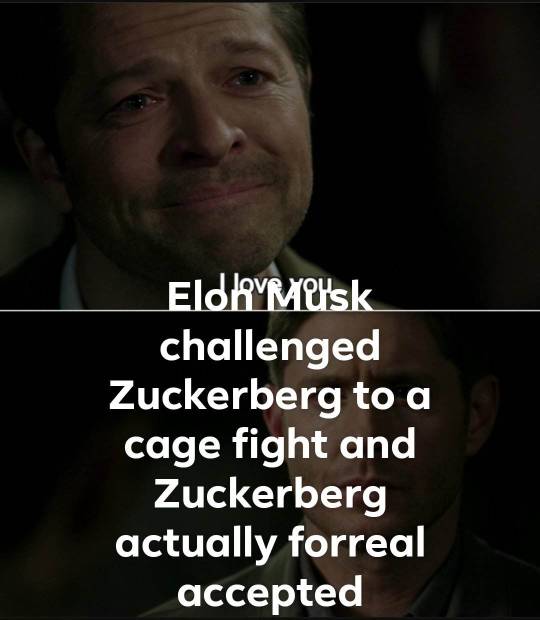
#elon musk#elon#the muskrat#mark zuckerberg#zuckerberg#musk vs zuckerberg#this is insane gjdnddn#like the news confirmed with him that he wasnt kidding#gingerswagfreckles
31K notes
·
View notes
Photo
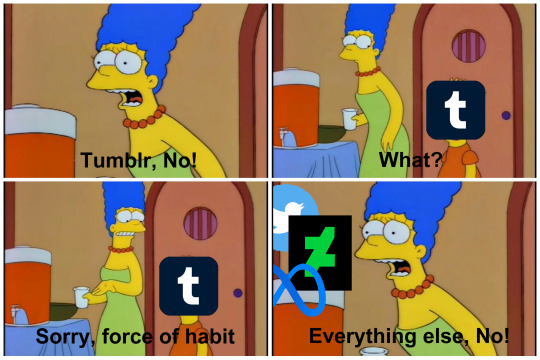
#elon musk#twitter#deviantart#meta#zuckerberg#tumblr#wow tagging things as meta means something different now but I guess here it has both meanings#a meme
58K notes
·
View notes
Text
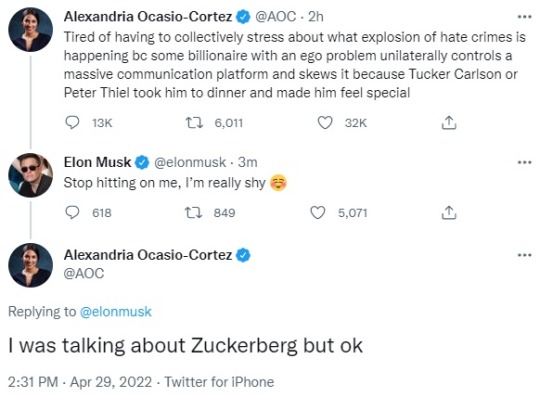
#Elon musk#aoc#twitter#facebook#mark zuckerberg#zuckerberg#millennials#democrats#republicans#donald trump#woc#Tulsa
63K notes
·
View notes
Text

4chan is often vile but it produces some genuinely funny shit once in a while
#greentext#4chan#4chan greentext#196#blade runner#voight kampff test#Voight-Kampff test#mark zuckerberg#Zuckerberg
62 notes
·
View notes
Link
Non-paywalled version here.
“The Federal Trade Commission on Wednesday [May 3rd] announced a plan to bar Facebook parent company Meta from monetizing the data of children and teens under the age of 18, citing allegations that the company misled parents about their ability to control their children’s communications in its Messenger Kids app.
The agency is seeking to update a landmark 2020 privacy settlement with Meta, which it says the company has already violated. The $5 billion order required the company to keep close watch over how third-party companies accessed users’ data and submit to regular privacy audits.
The FTC alleges that the company continued to give app developers’ access to users’ private information, after it promised to cut off access in the wake of the Cambridge Analytica data scandal, which revealed the political consultancy improperly gained access to the data of millions of Facebook users.
FTC Chair Lina Khan (D), a prominent tech industry critic, has promised to use the agency’s tools to more strictly monitor whether big companies are adhering to privacy agreements with the agency. Many Democrats criticized the FTC’s historic $5 billion settlement following Cambridge Analytica for not being tough enough. Now with a 3-0 majority at the agency, the party is newly emboldened to pursue tougher penalties.
The announcement comes as policymakers from both parties grow increasingly concerned about the impact of social media on children and teens. On Tuesday, a bipartisan group of senators revived multiple bills aimed at protecting kids and teens online...
Under the FTC’s new proposal, Meta would only be allowed to collect and use data about users under the age of 18 to provide services or for security purposes. It would not be able to use that data for commercial gain. The company would also be barred from launching new products or services until after they get a written assessment that they’re fully complying with the company’s privacy program. The rules would apply to any company that Meta acquires, including in virtual reality.
The announcement is just the first step in an administrative process to modify the 2020 order. Meta will have 30 days to respond to the agency’s plan.”
-via Washington Post, 5/3/23
#facebook#meta#instagram#zuckerberg#vr#big tech#digital privacy#privacy scandal#us politics#united states#ftc#federal trade commission#good news#hope
136 notes
·
View notes
Text
EU to Facebook: 'Drop Dead'

A leak from the European Data Protection Board reveals that the EU’s top privacy regulator is about to overrule the Irish Data Protection Commission and declare Facebook’s business model illegal, banning surveillance-based ads without explicit consent:
https://noyb.eu/en/noyb-win-personalized-ads-facebook-instagram-and-whatsapp-declared-illegal
In some ways, this is unsurprising. Since the GDPR’s beginning, it’s been crystal clear that the intention of the landmark privacy regulation was to extinguish commercial surveillance and ring down the curtain on “consent theater” — the fiction that you “agree” to be spied on by clicking “I agree” or just by landing on a web-page that has a link to some fine-print.
Under the GDPR, the default for data-collection is meaningful consent, meaning that a company that wants to spy on you and then sell or use the data it gathers has to ask you about each piece of data they plan to capture and each use they plan to make of it.
These uses have to be individually enumerated, and the user has to actively opt into giving up each piece of data and into each use of that data. That means that if you’re planning to steal 700 pieces of information from me and then use it in 700 ways, you need to ask me 1,400 questions and get a “Yes” to each of them.
What’s more, I have to be given a single tickbox at the start of this process that says, “No to all,” and then I have to be given access to all the features of the site or service.
The point of this exercise is to reveal consent theater for the sham it is. For all that apologists for commercial surveillance insist that “people like ads, so long as they’re well-targeted” and “the fact that people use high-surveillance services like Facebook shows a ‘revealed preference’ for being spied on,” we all know that no one likes surveillance.
There’s empirical proof of this! When Apple added one-click tracker opt-out on its Ios platform, 96% of users opted out, costing Facebook more than $10b in the first year (talk about a ‘revealed preference!’) (of course, Apple only opted those users out of tracking by its rivals, and secretly continued highly invasive, nonconsenual tracking of its customers):
https://pluralistic.net/2022/11/14/luxury-surveillance/#liar-liar
Properly enforced, the GDPR would have upended the order of the digital world: any argument about surveillance between product managers at a digital firm would have been settled in favor of privacy, because the pro-privacy side could argue that no one would give consent, and the very act of asking would scare off lots of users.
But the GDPR wasn’t properly enforced, thanks to structural problems with European federalism itself. The first line of GDPR enforcement came from privacy regulators in whatever country a privacy-violator called home. That meant that when Big Tech companies violated the GDPR, they’d have to account for themselves to the privacy regulator in Ireland.
For multinational corporations, Ireland is what old-time con-artists used to call a “made town,” where the cop on the beat is in on the side of the criminals. Ireland’s decision to transform itself into a tax haven means that it can’t afford to upset the corporations that fly Irish flags of convenience and maintain the pretense that all their profits are floating in a state of untaxable grace in the Irish Sea.
That’s because there are plenty of other EU countries that compete with Ireland in the international race to the bottom on corporate governance: Malta, Luxembourg, the Netherlands, Cyprus, etc (and of course, there’s post-Brexit UK, where the plan is to create an unregulated haven for the worst, wealthiest companies in the world).
All this means that seeking Irish justice from a corporation that wronged you is like asking a court in Moscow to punish an oligarch’s commercial empire on your behalf. Irish regulators are either “dingo babysitters” (guards in league with the guarded) or resource-starved into ineffectual torpor.
That’s how Facebook got away with violating the GDPR for so many years. The company hid behind the laughable fairy-tale that it didn’t need our consent to spy on us because it had a “legitimate purpose” for its surveillance, namely, that it was contractually obliged to spy on us thanks to the “agreement” we clicked on when we signed up for the service.
That is, you and Facebook had entered into a contract whereby Facebook promised you that it would spy on you, and if it didn’t spy on you, it would be violating that promise.
Har.
Har.
Har.
But while the GDPR has a structural weakness — allowing corporations to choose to be regulated in countries that can’t afford to piss them off — it also has a key strength: the private right of action, that is, the right of individuals to sue companies that violate the law, rather than having to convince a public prosecutor to take up their case.
https://www.eff.org/deeplinks/2019/01/you-should-have-right-sue-companies-violate-your-privacy
The private right of action is vital to any privacy regulation, which is why companies fight it so hard. Whenever a privacy bill with a private right of action comes up, they tell scare-stories about “ambulance chasers” who’ll “clog up the system,” trotting out urban legends like the McDonald’s Hot Coffee story:
https://pluralistic.net/2022/06/12/hot-coffee/#mcgeico
But here we are, in the last days of 2022, and the private right of action is about to do what the Irish regulators wouldn’t do: force Facebook to obey the law. For that, we can thank Max Schrems and the nonprofit he founded, noyb.
Schrems, you may recall, is the Austrian activist, who, as a Stanford law student, realized that EU law barred American tech companies from sending their surveillance data on Europeans to US data-centers, which the NSA and other spy agencies treated as an arm of their own surveillance projects:
https://pluralistic.net/2020/07/16/text-adventures-resurgent/#nein
Schrems brought a case against the Irish regulator to the EU’s top privacy authority, arguing that it had failed its duty by ruling that Facebook’s “contractual obligation” excuse held water. According to the leaked report, Schrems has succeeded, which means, once again, Facebook’s business model is illegal.
Facebook will doubtless appeal, but the writing is on the wall here: it’s the end of the line for surveillance advertising in Europe, an affluent territory with 500m+ residents. This decision will doubtless give a tailwind to other important privacy cases in the EU, like Johnny Ryan’s case against the ad-tech consortium IAB over its “audience taxonomy” codes:
https://pluralistic.net/2021/06/16/inside-the-clock-tower/#inference
It’s also likely good news for Schrems’ other ongoing cases, like the one he’s brought against Google:
https://pluralistic.net/2020/05/15/out-here-everything-hurts/#noyb
Facebook has repeatedly threatened to leave the EU if it is required to stop breaking the law:
https://pluralistic.net/2020/09/22/uncivvl/#fb-v-eu
This is a pretty implausible threat, growing less plausible by the day. The company keeps delivering bad news to investors, who are not mollified by Mark Zuckerberg’s promise to rescue the company by convincing all of humanity to spend the rest of their lives as highly surveilled, legless, sexless, low-polygon cartoon characters:
https://www.fool.com/investing/2022/12/06/why-meta-platforms-stock-dove-today/
Zuckerberg and his entire senior team have seen their net worth plummet with Meta’s share price, and that means the company needs to pay engineers with actual dollars, rather than promises of shares, which kills the massive wage-bill discount the company has enjoyed. This is not a company that can afford to walk away from Europe!
Between Apple’s mobile (third-party) tracker-blocking and the EU calling time on surveillance ads, things are looking grim for Facebook. You love to see it! But things could get even worse, and soon, thanks to the double-edged sword of “network effects.”
Facebook is a network effects business: people join the service to socialize with the people who are already there — then more people join to socialize with them. But what network effects give, they can also take away: a service that gets more valuable when a new user signs up loses value when that user leaves.
This is beautifully explained in danah boyd’s “What if failure is the plan?” which recounts boyd’s experiences watching MySpace unravel as key nodes in its social graph disappeared when users quit: “Failure of social media sites tends to be slow then fast”:
http://www.zephoria.org/thoughts/archives/2022/12/05/what-if-failure-is-the-plan.html
Facebook long understood this, which is why it spent years creating artificial “switching costs” — penalties it could impose on users who quit, such as the loss of their family photos:
https://www.eff.org/deeplinks/2021/08/facebooks-secret-war-switching-costs
This is why Facebook and other tech giants are so scared of interoperability, and why they are so furious about the new EU Digital Markets Act (DMA), which will force them to allow new services to connect to their platforms, so that users who quit Big Tech won’t have to lose their friends or data:
https://www.eff.org/deeplinks/2022/04/eu-digital-markets-acts-interoperability-rule-addresses-important-need-raises
An interoperable Facebook would make it easy to leave social media by removing the penalties Facebook imposes on its disloyal users, and the EU’s privacy framework means that when they flee to a smaller safe haven, they won’t have to worry about commercial surveillance:
https://www.eff.org/interoperablefacebook
But what about advertising-supported media? Sure, being spied on sucks, but a subscription-first media landscape is a world where “the truth is paywalled, but the lies are free”:
https://www.currentaffairs.org/2020/08/the-truth-is-paywalled-but-the-lies-are-free/
Ironically, killing surveillance ads is good news for ad-driven media. Surveillance-based ad-targeting is nowhere near as effective as Google, Facebook and the other ad-tech companies claim (these companies are compulsive liars, it would be amazing if the only time they told the truth is when they were boasting about their products!):
https://onezero.medium.com/how-to-destroy-surveillance-capitalism-8135e6744d59
And consent-theater or no, targeted ads reach fewer users every day, thanks to ad- blockers, AKA, “the biggest boycott in world history”:
https://blogs.harvard.edu/doc/2015/09/28/beyond-ad-blocking-the-biggest-boycott-in-human-history/
And when a publisher does manage to display a targeted ad, they get screwed. The Googbook dupololy is a crooked affair, with the two tech companies illegally colluding (via the Jedi Blue conspiracy) to divert money from publishers to their own pockets:
https://techcrunch.com/2022/03/11/google-meta-jedi-blue-eu-uk-antitrust-probes/
Targeted ads are a cesspit of ad-fraud. 15% of all ad revenues are just unaccounted for:
https://twitter.com/swodinsky/status/1511172472762163202
The remaining funds aren’t any more trustworthy. Ad-tech is a bezzle (“the magic interval when a confidence trickster knows he has the money he has appropriated but the victim does not yet understand that he has lost it”):
https://pluralistic.net/2021/01/04/how-to-truth/
As Tim Hwang foretold in his essential Subprime Attention Crisis, the pretense that targeted ads are wildly effective has been slowly but surely losing ground to the wider awareness of the fraud behind the system, and a reckoning is at hand:
https://pluralistic.net/2020/10/05/florida-man/#wannamakers-ghost
Experiments with contextual ads (ads based on the content of the page you’re looking at, not on your behavior and demographics) have found them to about as effective in generated clicks and sales as surveillance ads.
https://pluralistic.net/2022/04/29/taken-in-context/#creep-me-not
But this is misleading. Contextual ads don’t require consent opt-in (because they’re not based on your data) and they don’t drive users to install blockers the way creepy surveillance ads do, so lots more people will see a contextual ad than a surveillance one. Thus, even if contextual ads generate slightly less money per reader or viewer, they generate far more money overall, because they are aren’t blocked.
Even better for publishers: contextual ads don’t erode their own rate cards. Today, when you visit a high-quality publisher like the Washington Post, many ad brokers bid to show you an ad, but only one wins the auction. However, all the others have tagged you as a “Washington Post reader,” and they can sell that to bottom-feeder junk sites. That is, they can collude with Tabooleh or its rivals to offer advertisers a chance to advertise to Post readers at a fraction of what the Post charges. Lather, rinse, repeat, and the Post’s own ad revenues are drained.
This doesn’t apply with contextual ads. Indeed, none of the tech giants’ much-vaunted “data advantage” — the largely overstated value of knowing what you did online 10 or 20 years ago, the belief in which keeps new companies out of the market — applies to context ads:
https://pluralistic.net/2021/04/11/halflife/#minatory-legend
The transformative power of banning surveillance advertising goes beyond merely protecting our privacy. It also largely answers the case for “link taxes” (pseudo-copyright systems that let giant media companies decide who can link to them and charge for the privilege).
The underlying case for link taxes, snippet taxes, etc, is that Big Tech is stealing the news media’s content (by letting their users talk about and quote the news), when the reality is that Big Tech is stealing their money (through ad-fraud):
https://doctorow.medium.com/big-tech-isnt-stealing-news-publishers-content-a97306884a6b
Unrigging the ad-tech market is a much better policy than establishing a link-tax, like the Democrats are poised to do with their Journalism Competition and Preservation Act (JCPA):
https://www.politico.com/newsletters/politico-influence/2022/12/06/jcpa-opponents-spring-into-action-to-block-ndaa-inclusion-00072602
It’s easy to understand why the monopoly/private-equity-dominated news industry wants JCPA, rather than a clean ad market. The JCPA just imposes a tax on the crooked ad-tech giants that is paid to the largest media companies, while a fair ad market would reward the media outlets that invested most in news (and thus in expensive, unionized news-gathering reporters).
Indeed, the JCPA only works if the ad-tech market remains corrupt: the excess Big Tech rents that Big News wants to claim here are the product of a rigged system. Unrig the system and there won’t be any money to pay the link tax with.
Image:
Anthony Quintano (modified)
https://commons.wikimedia.org/wiki/File:Mark_Zuckerberg_F8_2018_Keynote_%2841118883004%29.jpg
CC BY 2.0
https://creativecommons.org/licenses/by/2.0/deed.en
[Image ID: A theater proscenium. Over the proscenium, in script, are the words 'Consent Theatre.' On the screen is an image of Mark Zuckerberg standing in front of the words 'Data Privacy.' He is gesturing expansively. A targeting reticle is centered on his face. The reticle is made of the stars from the EU flag.]
#pluralistic#zuckerberg#zucked#facebook#social media deathwatch#private right of action#gdpr#surveillance advertising#contextual advertising#consent theater#link tax#snippet tax#surveillance#commercial surveillance#business#news#eu#dma#DSA#max schrems#noyb#corruption#ireland
317 notes
·
View notes
Text
Oop just had a prediction. The "Zuck vs Musk" cage fight is going to be super hyped up, get some cushy deals to livestream it with Twitch or whatever, also be set up to stream live on some major tv news channels, and then when it finally happens...
It'll be in the metaverse fighting with vr "avatars" or whatever
#Musk#Zuckerberg#Cage fight#mark zuckerberg#Mark Zuckerberg vs Elon musk#Elon musk#Zuckerberg vs Musk#Musk vs Zuckerberg#Musk vs Zuck#Musk Zuckerberg cage fight#Zuckerberg Musk cage fight#...am I missing any permutations here?#Mine#Metaverse#Vr#Virtual reality
138 notes
·
View notes
Text
L'UNICO EFFETTO DEI POST CHE NON DANNO IL PERMESSO A ZUCKERBERG DI FARE COSE...
Come sapete su Facebook c'è un algoritmo di visibilità.
Cosa fa quest'algoritmo, a parte oscurare i post che parlano dei massacri perpetrati da eserciti nella S di G e mettere in punizione le pagine che li pubblicano, riducendo la visibilità di tutti i loro contenuti, per indurle a parlare di pupazzi di peluche e zainetti?
Quest'algoritmo ci classifica per proporci spot pubblicitari su misura.
Una volta ho commentato il post di una conoscente che raccontava i suoi problemi di salute e l'algoritmo mi ha inquadrato a modo suo.
L'algoritmo si è detto: «Bene, questo tizio sui cinquant'anni (età che comincia a stimolare certe riflessioni) ha manifestato interesse per queste cose. Provvedo subito».
Risultato: per due settimane Facebook mi ha sommerso di pubblicità su badanti e case di riposo.
Dunque l'algoritmo ci classifica. Ci mette un'etichetta addosso e dirotta verso di noi inserzioni personalizzate. Le sue conclusioni sono spesso grossolane e iperboliche, ma ci prova.
La stessa cosa accade quando copiamo e incolliamo post che non autorizzano Zuckerberg a fare cose.
L'algoritmo di Facebook trae delle conclusioni su di noi.
E Facebook ci sommergerà di pubblicità riguardanti creme che promettono di eliminare le smagliature già dopo la prima settimana.
FINE
[L'Ideota]
33 notes
·
View notes
Text
How is the Musk vs. Zuckerberg cage fight not all over tumblr immediately this is insane this is God's gift to mankind this is the funniest thing that's ever happened in the history of planet earth. Eat the rich???? Eat the rich??!!?!?! We aren't going to even get the CHANCE to eat the rich bc they are literally, LITERALLY going to kill each other with their teeth!!!!!
#gingerswagfreckles#elon musk#elon#the muskrat#mark zuckerberg#zuckerberg#musk vs zuckerberg#i think maybe bc none of yall check the real news ur not understanding that this is forreal and like actually fucking happening??#that they have a place set and an agency organizing it already and have both confirmed theyre dead fucking serious??#like its not a joke they are actually literally actually going to beat the shit out of each other on live TV this is the crazy#craziest thing ive evrr seen irl#like we have had a lot of crazy shit happen the past couple of years but this might just take the cake forreal christ alive
716 notes
·
View notes
Quote
Mark Zuckerberg is reportedly building a $100 million compound in Hawaii — which includes more than a dozen buildings with 30 bedrooms and 30 bathrooms in total. It also includes a a huge underground bunker. I don’t want to hear that billionaires can’t afford a wealth tax.
Robert Reich
24 notes
·
View notes
Link
“Meta has fired its Election Integrity and Safety Teams and allowed the violent January 6th insurrection to be organized on its platforms. We now know that Mark Zuckerberg and Meta will lie to Congress, endanger the American people, and continually threaten the future of our democracy,” said Kyle Morse, Deputy Executive Director of the Tech Oversight Project, in a press release. “Congress and the Administration need to act now to ensure that Meta, TikTok, Google, X, Rumble, and other social media platforms are not actively aiding and abetting foreign and domestic actors who are openly undermining our democracy and social fabric.”
Zuckerberg, Musk and other tech executives think their billions can shield them from the consequences of continuing to peddle Trump’s Big Lie about the 2020 election - and profiting from it. That may be the case for now, let’s see once we go through the 2024 election.
#BigLie#MAGAParty#TraitorTrump#TrumpCrimeSpree#Facebook#Google#Twitter#Instagram#Meta#Zuckerberg#Election2024#TikTok#CorruptMAGA#Election2020
33 notes
·
View notes
Text
El hijo del hombre más rico de India presume un reloj de 1 millón de dólares ante Mark Zuckerberg y su esposa:
14 notes
·
View notes
Text

so i can't use the phrase "pinkwashing" on facebook. i tried three times, and could send other replies, including a censored version. so that's..... super cool
update: 1:57 pm : it's letting me now, in conversations unrelated to I/P. so no idea what that was about, very strange, but hopefully this edit goes through so nobody gets misinformed
#israel#palestine#censorship#pinkwashing#bds#boycott israel#boycott divest sanction#pink washing#facebook#zucc#zuckerberg#i don't even know what to tag i just feel like people should know this happened?#zionism#free palestine#i love you goodnight
11 notes
·
View notes
Text

The divorce-o-meter just peaked in the red and exploded
#mark zuckerberg#zuckerberg#fuck zuckerberg#musk vs zuckerberg#fuck elon musk#anti elon musk#elon musk#x#twitter refugees#elon musk twitter#elon twitter#twitter meme#twitter#billions of facebook users warned over dangerous mistake that could empty your bank#billions of facebook users warned of ‘job fraud’ that could cost you – eight key signs to look out for#facebook#meta#we’re ev experts – 10 things we hate about tesla and why elon’s electric car firm needs to do better#elongated man#elonjet#elon musty#fuck elon#elongated muskrat#elong musk#musk#snv tesla#tesla inc#teslamotors#tesla ceo#tesla
33 notes
·
View notes
Text
What Do "THEY" Know?



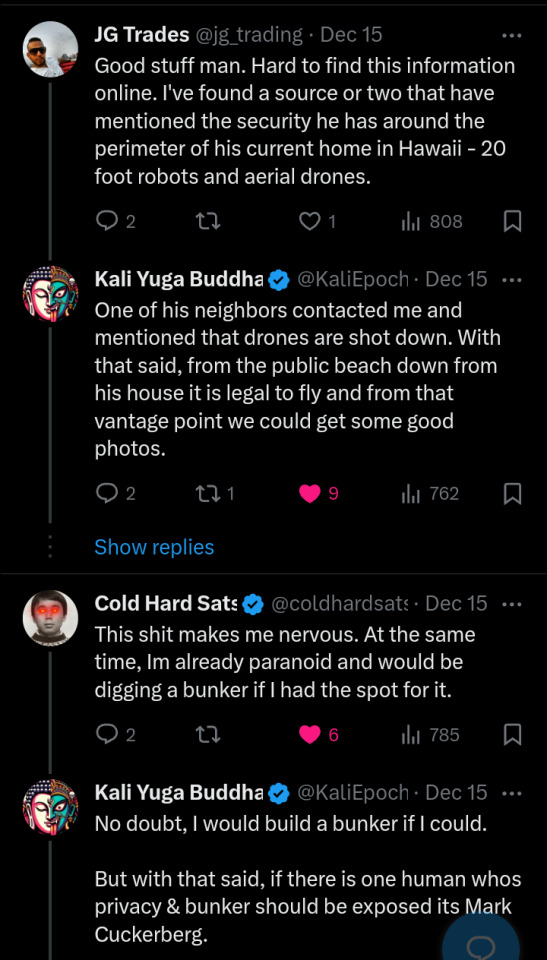
Then you have the Obama (Producer) for the Netflix movie "Leave The World Behind" .

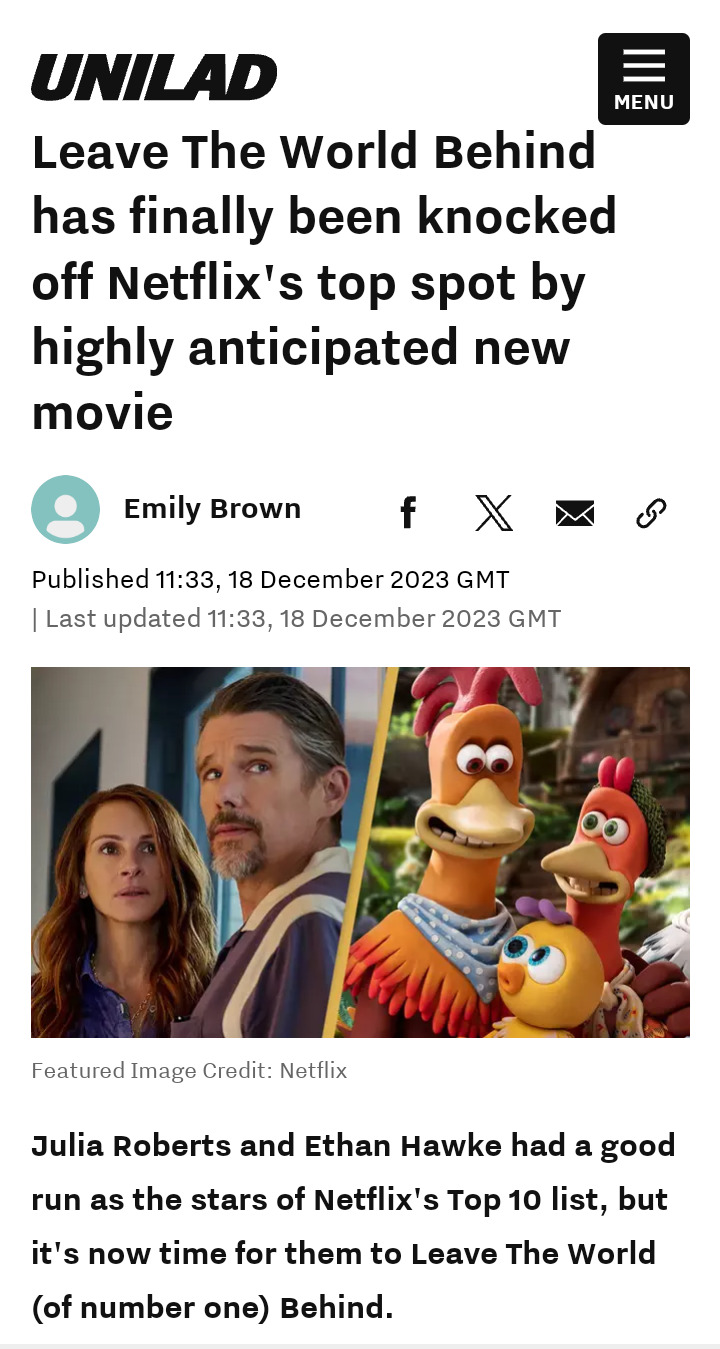
youtube
Next Spring we bring on "Civil War" and not a re-airing of Civil War with the Avengers in theaters.

youtube
I would recommend reading the book "One Second After" which is a novel about the United States being hit with an EMP.

It took me a week to finish it because I had to take a two day break due to it was causing my stress levels to go up.
I am remembered in High School we had to watch the ABC mini-series "The Day After" which was about nuclear missiles being shot from Russia and the United States retaliating.
youtube
I re-watched it during the C-19 lockdowns in 2020,and thought why would our teacher have us watch this and we were in H.S.
Zuckerberg's Underground Bunker
Are disaster movies about to be all the rage again like Deep Impact, Armageddon or because next year is an Election Year?
youtube
Digital World Our Future?
youtube
Monday
12.18.2023
L.George 🛸
#leave the world behind#civil war#onesecondafter#thedayafter#deep impact#armageddon#zuckerberg#zuckerbergbunker#undergroundbunker#thepurgetheelectionyear#Youtube
10 notes
·
View notes
Text
Actually pissing me off seeing in real-time people falling for the Zuckerberg redemption propaganda "wow, didn't think I'd ever be rooting for Zuck!" You don't have to. You can literally still hate both obnoxiously wealthy billionaires who steal your data, you don't have to choose one to be your hero. They are both still evil and some PR campaign of Zuckerberg getting in some dunks on Musk for pussying out of getting in the ring with him doesn't change the unmeasureable amount of harm Facebook caused.
#how soon they forget#Zuckerberg#musk#meta#twitter#musk vs zuckerberg#is all someone has to do these days to be redeemed in the public eye is be slightly witty?#what a godawfully sad low bar
22 notes
·
View notes